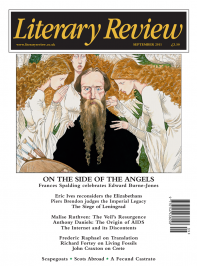John Boyne
Croker’s Lament
Shooting Angels
By Christopher Hope
Atlantic Books 272pp £17.99
At the midpoint of Christopher Hope’s new novel, narrator Charlie Croker takes a photograph that represents an idealised moment between him and three friends, one which comes to signify the turning point between happiness and despondency. It’s a powerful moment in the book, one of many hidden memories at the heart of Shooting Angels that Croker is forced to unearth, most of which he has long since buried.
Croker has tried hard to leave his past behind him. He lives quietly in a small South African town, far from the capital (the name of which he cannot even bring himself to utter), and teaches English to a classroom of students who resist it fiercely, sporting T-shirts

Sign Up to our newsletter
Receive free articles, highlights from the archive, news, details of prizes, and much more.@Lit_Review
Follow Literary Review on Twitter
Twitter Feed
It wasn’t until 1825 that Pepys’s diary became available for the first time. How it was eventually decrypted and published is a story of subterfuge and duplicity.
Kate Loveman tells the tale.
Kate Loveman - Publishing Pepys
Kate Loveman: Publishing Pepys
literaryreview.co.uk
Arthur Christopher Benson was a pillar of the Edwardian establishment. He was supremely well connected. As his newly published diaries reveal, he was also riotously indiscreet.
Piers Brendon compares Benson’s journals to others from the 20th century.
Piers Brendon - Land of Dopes & Tories
Piers Brendon: Land of Dopes & Tories - The Benson Diaries: Selections from the Diary of Arthur Christopher Benson by Eamon Duffy & Ronald Hyam (edd)
literaryreview.co.uk
Of the siblings Gwen and Augustus John, it is Augustus who has commanded most attention from collectors and connoisseurs.
Was he really the finer artist, asks Tanya Harrod, or is it time Gwen emerged from her brother’s shadow?
Tanya Harrod - Cut from the Same Canvas
Tanya Harrod: Cut from the Same Canvas - Artists, Siblings, Visionaries: The Lives and Loves of Gwen and Augustus John by Judith Mackrell
literaryreview.co.uk